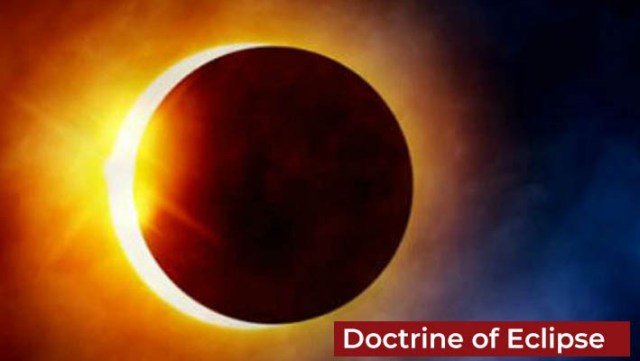Introduction
The Doctrine of Eclipse may be a doctrinal principle that advocates the concept of fundamental rights being prospective. The laws are hidden by the relevant fundamental rights, and therefore the Eclipse is claimed to be sew it. The inconsistency of the eclipsed law are often removed only the corresponding fundamental right is amended. The shadowing is then removed, and therefore the law becomes automatically valid and operative again.
The doctrine of eclipse says that any law which is inconsistent with fundamental rights isn’t valid. Such a law isn’t totally dead but is overshadowed by the fundamental right.
The inconsistency (conflict) within the impugned law and fundamental right are frequently removed by establishing constitutional amendment to the significant fundamental right in order that eclipse vanishes and therefore the entire law becomes valid.
In other words, till the time a provision of law violates a fundamental right guaranteed by the Indian Constitution, it’s dormant and inoperative. But if such fundamental right is revised by the Parliament and therefore, the law does not violate such fundamental right anymore, then in such a situation the law becomes alive and operative.
In Bhikhaji v. State of Madhya Pradesh, the provisions of C.P. and Berar automobiles (Amendment) Act 1948 authorized the government of M.P to require up the whole motor transport business within the Province to the exclusion of motor transport operators.
This provision was valid when enacted, but became void when the Constitution in 1950 commenced because it violated Article 19(1)(g) of the Constitution. However, in 1951 Clause (6) of Article 19 of the Constitution was amended by the Constitution (1st Amendment) Act, which authorized the govt to monopolize any business. The Supreme Court observed that the target of the amendment was to get rid of the eclipse and to form the impugned Act free from any infirmity. It became enforceable against citizens also as non-citizens after the constitutional impediment was removed.
In Keshava Madhava Menon v. State of Bombay, the petitioner was prosecuted under a Press law for publishing a pamphlet without permission. While the prosecution was ongoing, the Constitution commenced and therefore the petitioner challenged the act as unconstitutional. Issues arose
- whether sections 15(1) And 18(1) read with the definitions carried in sections 2(6) and 2(10) of the Indian Press (Emergency Powers) Act, 1931, were uncertain with article 19(1)(a) read with clause (2) of that article?
- Assuming that they were uncertain, whether the proceedings begins under section 18(1) of that Act before the commencement of the Constitution could nonetheless be proceeded with?
The court held that the constitutional rights came from the date of commencement of the Constitution, therefore the question of the inconsistency between the prevailing laws and fundamental rights must necessarily appear on and from the date those rights came into being.
In Deep Chand v. State of Uttar Pradesh, the Supreme Court held that a post- Constitutional law is void from its inception if it’s found to be inconsistent with the fundamental rights, but a pre-Constitution law having been validly enacted earlier to the commencement of the Constitution would continue effective thus far as non-citizens are concerned after the Constitution came into force. This is often so because before commencement of the constitution legislature had the competence to pass such act but after the commencement of the Constitution, the legislature doesn’t have the competence to pass.
In Shankri Prasad v. Union of India, the constitutional validity of the Constitution (1st Amendment) Act, 1951, which curtailed the proper to property, was challenged. The Court held that the facility to amend the Constitution under Article 368 also included the facility to amend fundamental rights enumerated partially III of the Constitution which the word “law” in Article 13(3) of the Constitution includes only a standard law made in exercise of the legislative powers and doesn’t include Constitutional amendment which is formed in exercise of constituent power. Therefore, a Constitutional amendment is going to be legally valid albeit it abridges or takes any of the fundamental rights.
In Mahendra Lal Jaini v. State of U.P., the Court said that Article 13(1) of the Constitution recognizes the existence of pre-Constitutional laws which were valid when enacted, and thus might be revived by the doctrine of eclipse and Article 13(2) provides for a direction to the State to not make a law which takes away or abridges the rights conferred by Part III of the Constitution. The legislative power of Parliament of India and State Legislatures under Article 245 is subject to the opposite provisions of the Constitution and thus, subject to Article 13(2).
Conclusion
In India, the Doctrine of Eclipse is one such theory that’s said to safeguard the pre-constitutional laws from being completely exhausted. It gives us a really refined, nuanced aspect of the rule of law. Theorists believe that if there have been no Doctrine of Eclipse, then constitutionalism would’ve been compromised. This theory has helped break the skinny line between pre-constitutional laws and therefore the post-constitutional laws. it’s a tool to harmonize the central dictates of the Indian Constitution.
This article has been written by Mauli Bisen, BBA.LLB [2nd Year] student at LNCT University.
Note – The information contained in this post is for general information purposes only. We try our level best to avoid any misinformation or abusive content. If you found any in this website, please report us at [email protected]
Interested to publish an article at Law Corner? Click Here to submit your article.
